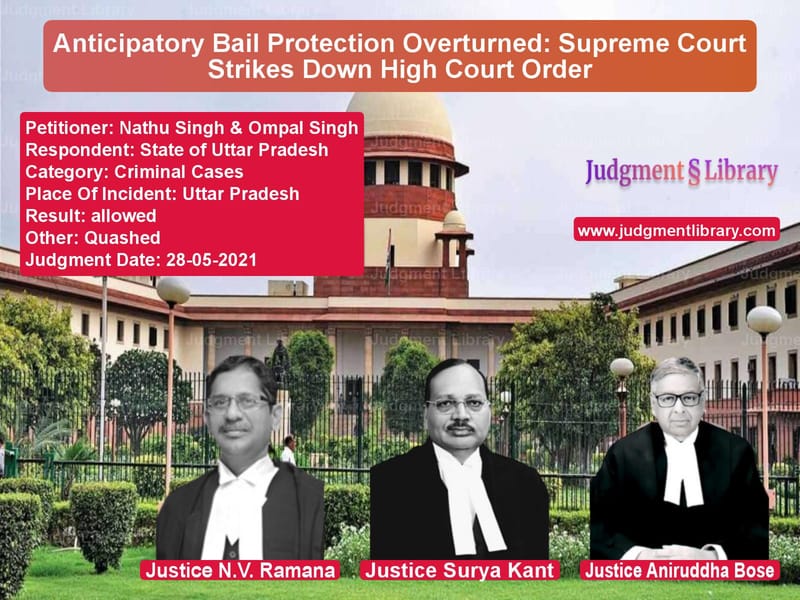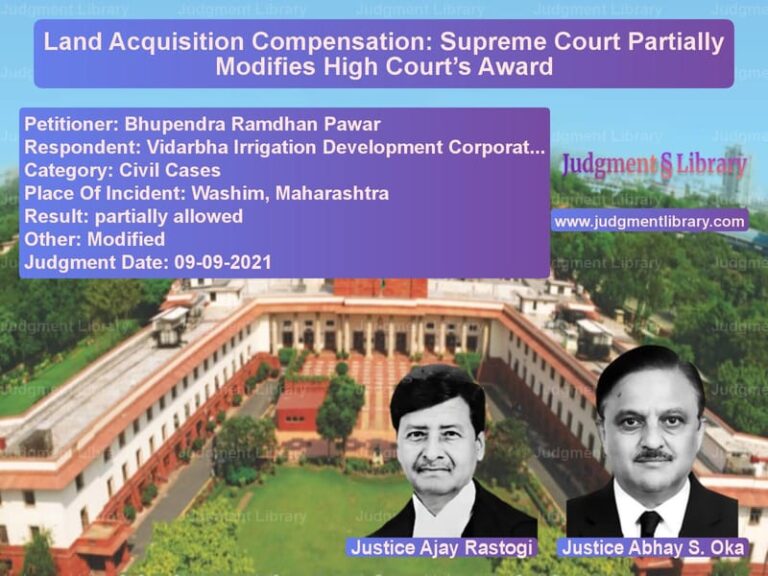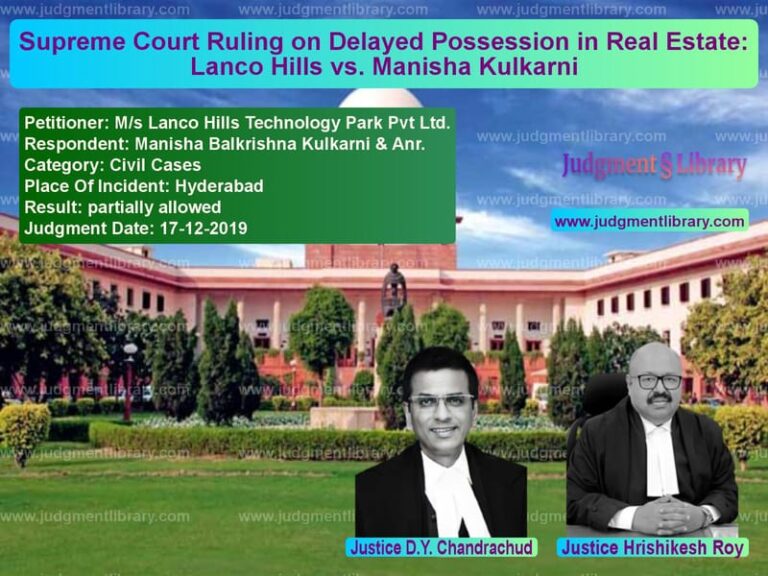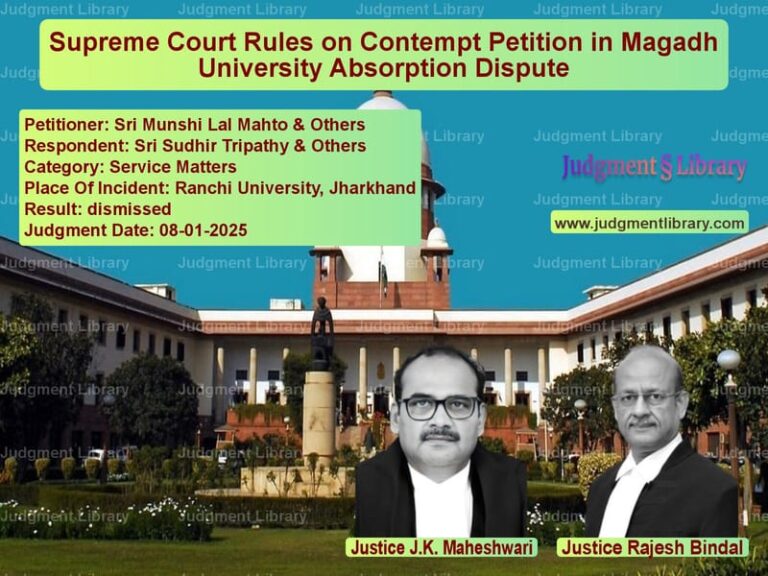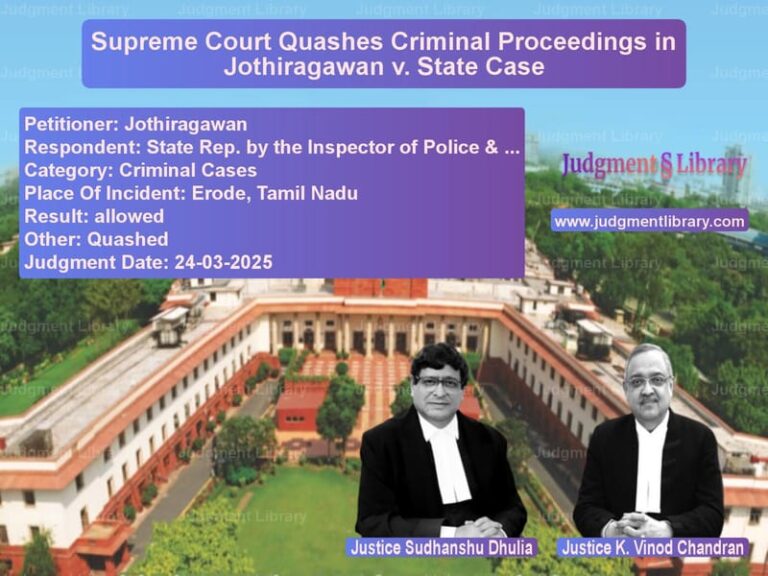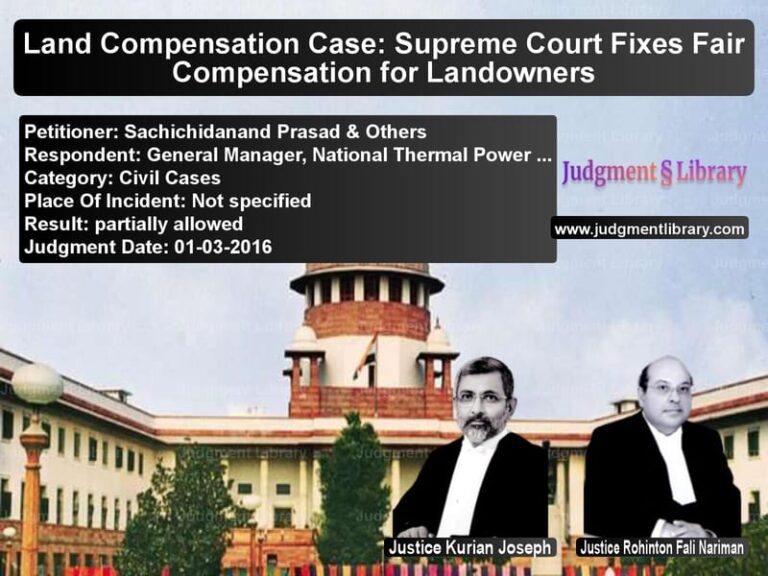Anticipatory Bail Protection Overturned: Supreme Court Strikes Down High Court Order
The Supreme Court of India has ruled that a High Court cannot grant anticipatory bail protection after rejecting an anticipatory bail plea. In the case of Nathu Singh & Ompal Singh v. State of Uttar Pradesh, the Supreme Court overturned an order by the Allahabad High Court that had dismissed the anticipatory bail applications but granted the accused protection from coercive action for 90 days.
Background of the Case
The case involved two separate criminal appeals related to anticipatory bail. In the first case, Nathu Singh’s daughter died under suspicious circumstances in her matrimonial home. A First Information Report (FIR) was lodged under Sections 304B and 498A of the Indian Penal Code (IPC) along with Sections 3 and 4 of the Dowry Prohibition Act. In the second case, Ompal Singh’s brother and his two sons were allegedly attacked over a land dispute. One of the sons suffered a skull fracture and was in a coma for a week. An FIR was filed under Sections 307, 504, and 34 of the IPC.
Both accused individuals approached the Allahabad High Court seeking anticipatory bail under Section 438 of the Code of Criminal Procedure (CrPC). The High Court dismissed their applications but granted them 90 days to surrender before the trial court, protecting them from arrest during this period.
Arguments by the Petitioners (Complainants)
The complainants, who appealed the High Court’s order before the Supreme Court, argued:
- Once the High Court dismissed an anticipatory bail plea, it had no authority to grant any further protection from arrest.
- The protection granted to the accused hindered the police investigation.
- The impugned order was contrary to Section 438(1) of CrPC, which states that once bail is denied, the police can arrest the accused.
- The High Court’s order effectively allowed the accused to evade justice for 90 days, undermining the criminal justice system.
Arguments by the Respondents (Accused)
The accused defended the High Court’s order, arguing:
- The High Court had the discretionary power to pass any order in the interest of justice.
- The 90-day protection was necessary to allow them time to approach the trial court for regular bail.
- The order did not prevent the trial court from deciding on their bail applications independently.
Supreme Court’s Observations and Verdict
1. Interpretation of Section 438 CrPC
The Supreme Court emphasized that Section 438 CrPC pertains only to the grant or denial of anticipatory bail. It held:
“Once the High Court rejects an anticipatory bail application, it has no jurisdiction to grant further protection.”
2. High Court’s Overreach
The Court ruled that the High Court exceeded its jurisdiction by granting a 90-day protection despite rejecting the anticipatory bail applications. It observed:
“The power of judicial discretion does not extend to providing reliefs beyond the legal framework.”
3. Impact on Police Investigation
The Supreme Court noted that the protection given to the accused hindered the ongoing police investigation and custodial interrogation. It stated:
“Granting protection after rejecting bail effectively ties the hands of the investigating agency and prevents justice from being served.”
4. The Role of Inherent Powers
The Court clarified that while High Courts have inherent powers under Section 482 CrPC, these powers cannot be used to override specific provisions of law. It reiterated:
“Inherent powers cannot be invoked to grant relief contrary to the statutory scheme of Section 438.”
Final Judgment
The Supreme Court allowed the appeals and set aside the High Court’s orders granting 90-day protection to the accused. It directed the investigating agency to proceed with the investigation in accordance with the law.
Conclusion
This ruling reinforces the principle that anticipatory bail, once denied, cannot be followed by a grant of protection from arrest. The Supreme Court’s decision ensures that judicial discretion is exercised within legal boundaries and that criminal investigations are not unduly hindered.
Petitioner Name: Nathu Singh & Ompal Singh.Respondent Name: State of Uttar Pradesh.Judgment By: Justice N.V. Ramana, Justice Surya Kant, Justice Aniruddha Bose.Place Of Incident: Uttar Pradesh.Judgment Date: 28-05-2021.
Don’t miss out on the full details! Download the complete judgment in PDF format below and gain valuable insights instantly!
Download Judgment: nathu-singh-&-ompal-vs-state-of-uttar-prade-supreme-court-of-india-judgment-dated-28-05-2021.pdf
Directly Download Judgment: Directly download this Judgment
See all petitions in Bail and Anticipatory Bail
See all petitions in Judgment by N.V. Ramana
See all petitions in Judgment by Surya Kant
See all petitions in Judgment by Aniruddha Bose
See all petitions in allowed
See all petitions in Quashed
See all petitions in supreme court of India judgments May 2021
See all petitions in 2021 judgments
See all posts in Criminal Cases Category
See all allowed petitions in Criminal Cases Category
See all Dismissed petitions in Criminal Cases Category
See all partially allowed petitions in Criminal Cases Category

